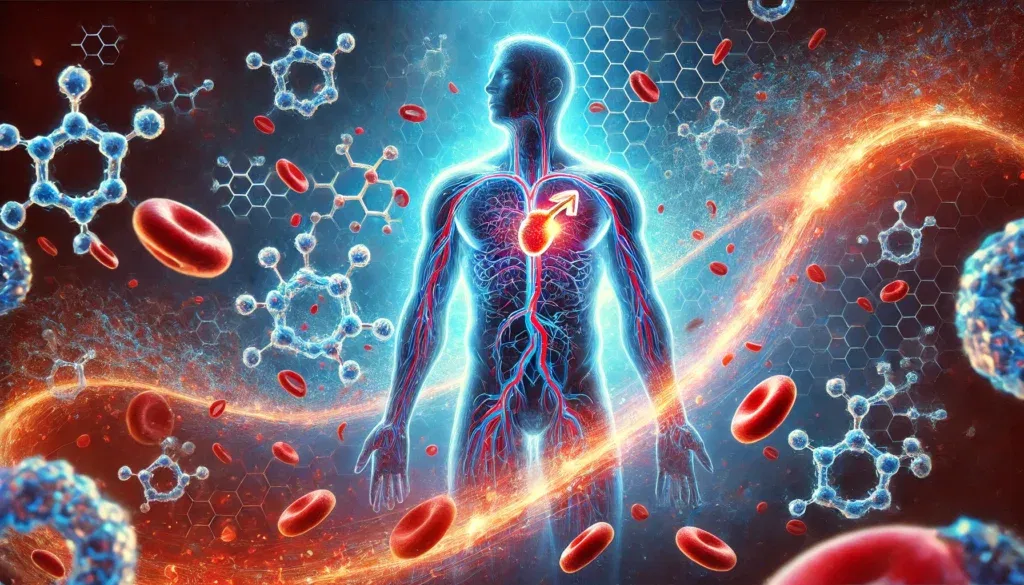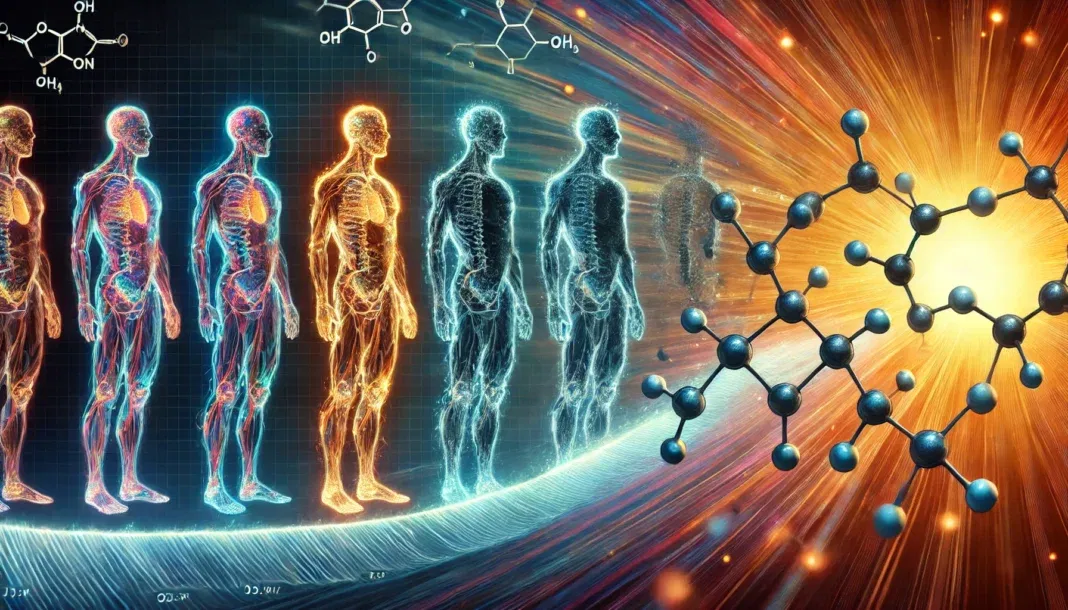Understanding Testosterone and Its Role
Testosterone plays a crucial role in male health, influencing everything from muscle mass to mood. Those using testosterone therapy or performance-enhancing substances often wonder: How long does testosterone stay in your system? The answer depends on the type of testosterone used, the method of administration, and various individual physiological factors. Understanding the duration and effects of testosterone is essential for optimizing its benefits while minimizing potential risks.
You may also like: How to Get Your Testosterone Levels Checked: Best At-Home and Lab Testing Options
Types of Testosterone and Their Duration
The duration of testosterone in the body varies based on the ester attached to the hormone.
Testosterone Cypionate: How Long Does It Last?
For instance, testosterone cypionate, one of the most common forms, has a half-life of approximately eight days, meaning it remains in the system for a prolonged period. Those asking, “How long does testosterone cypionate stay in your system?” should consider its pharmacokinetics. After an injection, levels peak within 24-48 hours, then gradually decline over the next two weeks. However, remnants can persist beyond this period, especially in long-term users.
Comparing Short and Long-Acting Testosterone Esters
Different testosterone esters break down at varying rates. Shorter esters, like testosterone propionate, clear the system more quickly, typically within a few days. In contrast, longer esters, such as testosterone enanthate or testosterone cypionate, maintain presence in the bloodstream for a more extended duration. This distinction is critical for those undergoing hormone replacement therapy (HRT) or athletes subject to drug testing.

How Long Do Testosterone Injections Stay in Your System?
A commonly asked question is: “How long does a testosterone shot stay in your system?” The answer depends on the ester, dosage, and individual metabolism. A standard injection of testosterone cypionate, for example, remains detectable for several weeks. This has implications for drug testing, as athletes and bodybuilders need to be aware of detection windows.
How Quickly Do Testosterone Levels Decline After Injection?
The metabolic process of testosterone also influences how quickly levels decline post-injection. Many wonder, “How fast do testosterone levels drop after injection?” Typically, levels peak shortly after administration, then begin to taper off. With shorter-acting esters, this decline happens rapidly, while longer-acting esters exhibit a gradual reduction. This is why consistent dosing is essential for those on testosterone therapy to maintain stable hormone levels.
Storage and Shelf Life: Does Testosterone Expire?
An essential aspect of testosterone storage is its shelf life. Users often ask, “Does testosterone need to be refrigerated?” and “Does testosterone expire?” While testosterone does not always require refrigeration, it should be stored at room temperature, away from direct light and extreme heat. Proper storage ensures its efficacy remains intact.
Can Testosterone Go Bad?
Expired testosterone may lose potency or, in rare cases, cause adverse reactions. Questions like “Does testosterone go bad?” and “Can testosterone go bad?” are valid concerns. While it does not spoil like perishable food, its effectiveness can diminish over time.
Is Out-of-Date Testosterone Still Effective?
Individuals considering older vials may question, “Is out-of-date testosterone still effective?” Pharmaceutical-grade testosterone usually has an expiration date indicating its optimal usage period. Using expired testosterone may result in suboptimal effects, as the hormone’s potency may degrade.
Understanding the Effects of Testosterone Injections
Understanding the effects of testosterone injections is also crucial. Many users ask, “How long does a testosterone injection stay in your system?” The answer varies, but on average, an injection of testosterone cypionate remains active for approximately two weeks, with detectable levels persisting for up to a month. This knowledge is important for those undergoing HRT or engaged in athletic competitions.
How Long Do Testosterone Shots Last?
Testosterone therapy can significantly improve well-being, but awareness of its pharmacokinetics is essential. For those wondering, “How long do testosterone shots last?” the answer depends on multiple factors, including the specific ester and individual metabolism. Regular monitoring and proper administration ensure optimal results while minimizing fluctuations in hormone levels.

Frequently Asked Questions (FAQ) on Testosterone Cypionate
1. How long does testosterone cypionate last in the body?
Testosterone cypionate has a half-life of approximately 8 to 10 days, meaning its effects can be sustained for up to two weeks after an injection. However, individual metabolism, activity levels, and dosage can impact how long it remains effective. While its anabolic effects persist beyond its peak, testosterone levels begin to decline gradually. Understanding how long testosterone cypionate stays in your system is crucial for those managing hormone therapy, bodybuilding, or medical conditions requiring consistent levels. Regular injections help maintain stable testosterone levels and prevent fluctuations that could affect mood, energy, and muscle retention.
2. How long does testosterone stay in your system after stopping injections?
The duration testosterone remains in the system depends on factors like dosage, metabolism, and injection frequency. Testosterone cypionate has a longer half-life than other forms, meaning it can take several weeks to fully clear from the body. Typically, it remains detectable in the blood for up to three weeks, but its complete elimination may take over a month. How fast testosterone levels drop after injection depends on individual hormone metabolism and whether post-cycle therapy (PCT) is used to support natural testosterone production. For competitive athletes, understanding clearance times is vital due to drug testing regulations.
3. Does testosterone need to be refrigerated for storage?
Testosterone cypionate does not typically require refrigeration, but it should be stored at room temperature between 68-77°F (20-25°C). Storing it in a cool, dry place away from direct sunlight helps maintain its potency. Extreme temperatures, such as excessive heat or freezing conditions, can degrade its effectiveness. While refrigeration is unnecessary, some users prefer to store it in a controlled environment to prolong its stability. Checking manufacturer guidelines on storage ensures optimal preservation of its therapeutic benefits.
4. Does testosterone expire, and what are the risks of using expired testosterone?
Like all medications, testosterone cypionate has an expiration date, usually printed on the vial. Expired testosterone may lose potency, affecting its efficacy in maintaining hormone levels. Additionally, degraded compounds could lead to irritation or adverse reactions when injected. While some medications remain stable past their expiration, it is not advisable to use out-of-date testosterone. Ensuring that testosterone is within its shelf life guarantees its effectiveness and reduces the risk of contamination or compromised results.
5. How fast do testosterone levels drop after an injection?
Testosterone levels peak within 24-48 hours after injection and then gradually decline over the following days. How long does a testosterone shot last depends on the ester type and individual metabolism. Testosterone cypionate maintains elevated levels for about 10-14 days, but levels start decreasing noticeably after a week. Without consistent administration, users may experience symptoms of low testosterone, including fatigue and mood swings. Understanding how fast testosterone levels drop after injection helps in scheduling doses to maintain hormonal balance.
6. Can testosterone go bad, and how do you know if it has?
Yes, testosterone cypionate can degrade over time, making it less effective. Signs that testosterone has gone bad include changes in color, cloudiness, or the presence of particles. If the solution appears different from when it was first used, it should be discarded. Does testosterone go bad faster in certain conditions? Yes, exposure to heat, light, or contaminants can accelerate degradation. Always check the expiration date and inspect the vial before use to ensure its safety and efficacy.
7. How long is testosterone good for once opened?
Once opened, testosterone cypionate remains effective as long as it is stored correctly and used before its expiration date. Proper handling, including using sterile needles and avoiding contamination, extends its usability. How long does test cypionate stay in your system depends on regular dosing, but its shelf life remains consistent as long as it is stored properly. If there are any changes in appearance or consistency, it is best to discard the vial and obtain a fresh supply to ensure effectiveness.
8. How long does a testosterone shot stay in your system for medical therapy or bodybuilding?
The duration of a testosterone shot’s effects depends on the ester type and the individual’s response. How long do testosterone shots last varies between users, but cypionate typically sustains testosterone levels for 10-14 days. For those on testosterone replacement therapy (TRT), weekly or bi-weekly injections help maintain steady hormone levels. Bodybuilders may follow different schedules depending on their goals. Monitoring levels with blood tests can help determine the ideal injection frequency for optimal results.
9. What are the side effects of expired testosterone use?
Using expired testosterone may result in reduced effectiveness and potential irritation at the injection site. Side effects of expired testosterone can include increased pain, inflammation, or allergic reactions due to possible bacterial contamination. Additionally, a loss of potency means that hormone levels may drop unexpectedly, leading to fatigue, decreased muscle mass, and mood swings. Always ensure that testosterone is within its expiration date to avoid compromised results and unwanted health risks.
10. How long does a testosterone injection stay in your system before it is fully eliminated?
Testosterone cypionate remains in the system longer than shorter-acting esters, with detectable levels lasting up to three weeks. How long does a testosterone injection stay in your system depends on metabolism, body composition, and frequency of administration. Competitive athletes should be aware that traces may be found in drug tests for over a month. Those stopping TRT or cycling off testosterone should consult a medical professional about post-cycle strategies to support natural hormone recovery. Understanding how long testosterone cypionate stays in your system is essential for maintaining proper hormonal balance and compliance with medical guidelines.

Conclusion: What to Expect from Testosterone in Your System
In conclusion, testosterone remains in the system for varying durations depending on the ester type, administration method, and individual physiology. Understanding how long testosterone cypionate lasts, how fast levels decline after injection, and whether testosterone expires are all vital considerations for users. Proper storage and adherence to medical guidance ensure its effectiveness. Those considering therapy or performance enhancement should stay informed about the duration and effects of testosterone to make educated decisions about their health and performance.
testosterone metabolism, hormone replacement therapy duration, testosterone injection effects, storage of testosterone, expired testosterone risks, testosterone ester comparison, athletic performance and testosterone, long-acting vs short-acting testosterone, hormone levels post-injection, testosterone clearance rates, testosterone cypionate pharmacokinetics, medical guidelines for testosterone therapy, drug testing detection windows, testosterone stability and storage, testosterone half-life variations, testosterone therapy best practices, testosterone administration frequency, performance enhancement risks, testosterone bioavailability, endocrine system and testosterone
Further Reading:
Onset of effects of testosterone treatment and time span until maximum effects are achieved
Pharmacology of testosterone replacement therapy preparations
Ask the Doc: How long do steroids stay in your system?
Disclaimer: The information provided in this article is for general informational purposes only. The content does not constitute professional advice of any kind, including but not limited to medical, legal, or financial advice. HisHealthMag and its contributors make no representations or warranties regarding the accuracy, completeness, or reliability of the information presented. Always seek the advice of a qualified professional for any specific concerns or questions you may have. Neither HisHealthMag nor its authors assume any responsibility or liability for any actions taken based on the information provided in this article. The views and opinions expressed are those of the author(s) and do not necessarily reflect the official policy or position of HisHealthMag.





